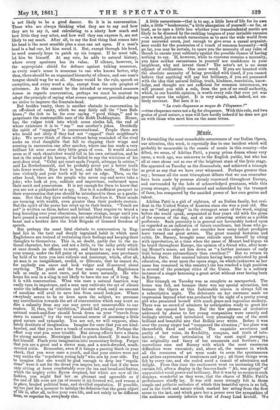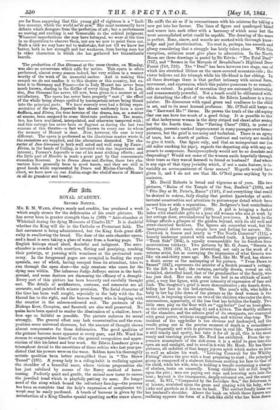altigir•
Ix chronicling the most remarkable occurrences of our Italian Opera, our attention, this week, is especially due to one incident which' will probably be memorable in the annals of music in this country—the abut, we mean, of Adelina. Patti, a young prima donna whose very name, a week ago, was unknown to the English public, but who has all at once shone out as one of the brightest stars of the lyric stage. She appeared on Tuesday as the Sonnambula, and achieved a triumph as great as any that we have ever witnessed. Perhaps greater than any ; because all the most triumphant abnts that we can remember have been made by persons already renowned throughout Europe, and surrounded by the halo of acknowledged greatness, while this young stranger, slightly announced and unheralded by the trumpet of fame, has conquered by the unaided power of her own genius and talent.
A.delina Patti is a girl of eighteen, of an Italian family, but resi- dent in the United States of America since she was a-year old. She was an "infant prodigy" in the strongest sense of the word, singing before she could speak, acquainted at four years old with the gems of the operas of the day, and at nine attracting notice as a public performer. Such precocity is in general not favourably looked upon
i
or regarded as an indication of future excellence, but those who ge- neralize on this subject do not consider how many infant prodigies have turned out great artists. The great musical historian and critic, Dr. Burney, brought some ridicule upon himself by citing with approbation, at a time when the name of Mozart had begun to be heard throughout Europe, the opinion of a friend who, after hear- ing Mozart's music, set him down as "a further instance of early fruit being more extraordinary than excellent !" But to return to Adelina Patti. Her musical talents having been cultivated by good education, she went upon the opera stage, on which (unknown as her name has remained in this country) she has reached a high position in several of the principal cities of the Union. She is a solitary instance of a singer becoming a great artist without ever having been in Europe. Her triumph on Tuesday was as complete as unexpected. The house was full, not because there was any special attraction, but because the Opera at this fashionable season is always full on a subscription night. The debutante on her entrance made no impression beyond what was produced by the sight of a pretty young girl who presented herself with much grace and ingenious modesty. There was no crowd of admirers by anticipation ready to greet her before she opened her lips. But the few. phrases of recitative addressed by Amine to her young companions were sweetly and feelingly uttered, and introduced very. pleasingly one of the most brilliant and beautiful airs that Bellini over wrote. Before it was over the young singer had "conquered the situation;" her place was thenceforth fixed and settled. The exquisite sweetness and purity of her voice, its flexibility, compass, and truth of into- nation ; the clear articulation of the most rapid passages ; the originality and fancy of her ornaments and fioriture ; the marvellous ease and fluency with which the most enormous difficulties were executed; and, above all, the manner in which all the resources of art were made to seem the spontaneous and artless expressions of tenderness and joy ; all these things were felt by every one, and she ended amid a tumult of admiration and delight. From this time the excitement went on increasing till the curtain fell, after a display in the famous finale " Ali, non gmnge" of unparalleled vocal power and brilliancy. But it was by no means in such displays, wonderful as they were, that the charm of Mdlle. Patti's performance chiefly lay. It was still more strongly felt in those simple and pathetic melodies of which this beautiful opera is so full, and in the truth and nature which marked her acting from the first scene to the last, and which gave her a power over the sympathies of the audience scarcely inferior to that of Jenny Lind herself. We are farfrom.supposin that This young ghl of eigliteenis a 'fault- less monster, which the wood &e'er saw." She must-necessarily have defects which iderogate.fromthe Terrection nf.art ; 'but a performance' so moving and exerting is net 'favourable to the critical judgment.- 'Whatever imperfections She may have betrayed, we were atihe time in no dispositionto observe-them, nor are we now to point them out. %Such a talk we mayhave 5et to-nndertake, Ind not till we know her 'better, both in her strength and her weakness, from having seen her in other characters in Which .-she 'has gathered her transatlantic laurels.































 Previous page
Previous page